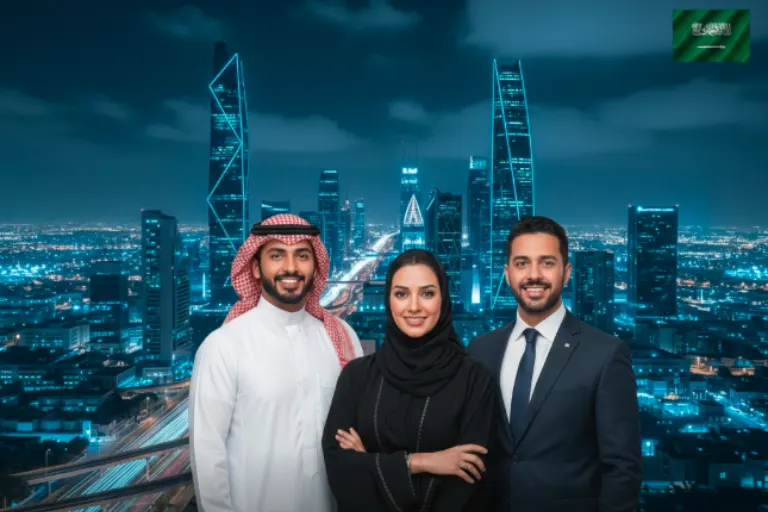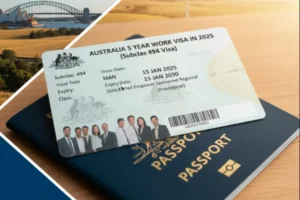Introduction: Ending The Kafala Sponsorship System
The Kingdom of Saudi Arabia is growing through a large change under its Vision 2030 plan. One of the most important and innovative actions is the demolition of the old Kafeel System (sponsorship system). These improvements are changing the lives of millions of migrant laborers and generating a completely new path for high-level residents and investors.
The change comes in two major parts:
- Ending Kafala for Workers: Granting over 13 million migrant workers new freedoms to change jobs and travel without their employer’s consent. This is the Saudi arabia ends kafala system for general employment.
- Sponsor-Free Residency: Presenting a Premium Residency program that lets wealthy professionals and investors live, work, and do business in the Kingdom long-lived with no Kafeel System needed.
This advance signals Saudi Arabia’s responsibility to align its labor laws with global guidelines, making the country a more charming destination for international talent and investment.
The End of the Kafeel System Era
For nearly 70 years, the Kafeel System (Arabic for “sponsor”) tied a migrant worker’s legal status directly to a Saudi employer, known as the kafeel. This framework granted employers too much power over the workers’ lives, such as control over their visas, residency, and permission to change jobs or leave the country.
Human rights groups strongly disapprove of this system because the system exposes workers to exploitation and abuse. The Kafala Sponsorship System managed cases of limited movement, salary disputes, and limited legal resources for workers. In June 2025, Saudi Arabia lawfully disclosed the end of the old Saudi kafala system, replacing it with a latest agreement-based employment structure.
Key Reforms for Migrant Workers
The abolition of the traditional Kafeel System for the general workforce introduces several new freedoms and protections, managed primarily through the digital platforms Qiwa and Absher.
Under the new contract-based framework, migrant workers can now:
- Change Jobs Freely: Workers can switch employers without their current employer’s consent after their contract ends (or after a certain period of service). This ends the need for a “no objection” certificate from the previous sponsor.
- Travel Independently: The previous requirement for a sponsor’s permission to leave or re-enter Saudi Arabia has been phased out. Workers can now apply for quit and re-entry visas straight away via government platforms.
- Legal Protection: Workers gain extended access to labor courts and grievance mechanisms, allowing them to report abuse or non-payment without fear of payback.
The fact that the kafala system abolished recently in Saudi Arabia applies to over 13 million workers, including large numbers from countries like India and the Philippines, makes this a historic milestone.
Read Also: Saudi eVisa vs. Visa on Arrival Rules Options for 2025
Premium Residency: The Sponsorship-Free Path
While the labor reform focuses on the rights of all migrant workers, a separate initiative the Premium Residency Program offers a pathway for skilled workers and investors to gain independence from the Kafeel System entirely. This program is for high-value individuals seeking long-term stability.
The Premium Residency Program offers two distinct options that abolish the need for a kafeel sponsor:
| Residency Type | Fee & Duration | Key Detail |
| Permanent Residency | One-off payment: $800,000 SAR (≈ $213,000 USD) | Grants lifetime residency without renewal. |
| Renewable Residency | Yearly fee: $100,000 SAR (≈ $26,700 USD) | Renewal is mandatory every year. |
Eligibility Criteria
To apply for this sponsor-free residency, applicants must meet the criterion requirements, such as being over 21, having a valid passport, a clean criminal record, and, fundamentally, being able to show proof of stable income or considerable assets. The abolition of the Kafeel System here attracts global talent by giving them complete control over their career and life in the Kingdom.
Read More: Dubai Golden Visa Expands to Include Exceptional Educators
Major Benefits of the New Law
The combination of the labor reforms and the Premium Residency program provides game-changing benefits:
- No Sponsor Needed: Residents and qualified workers can live and work independently without any local sponsor, truly ending the kafala system in Saudi Arabia.
- Business Freedom: Premium Residents can start a business or work in any field without the restrictions of a kafeel.
- Property Ownership: Premium Residents are allowed to buy property anywhere in the Kingdom (except restricted border and holy areas).
- Family Sponsorship: Residents can effortlessly sponsor their immediate family (spouse and children) for dependent visas.
- Lower Risk of Abuse: By enabling workers to switch jobs and travel, the Kafala System abolished in Saudi Arabia lowers the employer control that often led to exploitation. This transform grants workers greater freedom and protects their rights.
This structural shift away from the old Kafeel System is about improving transparency, attracting foreign investment, and modernizing the economy in line with Vision 2030.
Conclusion
The Kafeel system ends in Saudi Arabia, and the start of sponsor-free Premium Residency in 2025. This shift shows one of the most important legal changes in Saudi Arabia’s history. By providing workers freedom and investors independence, Saudi Arabia is aligning itself with international labor standards and opening its doors more extensive to the world.
The fact that the kafala system abolished has been replaced by a modern, contract-based system means better opportunities and greater dignity for millions of people. For expatriates dreaming of a stable and independent life in Saudi Arabia, this new law truly signals a new era where the Kafeel System is finally a thing of the past.











